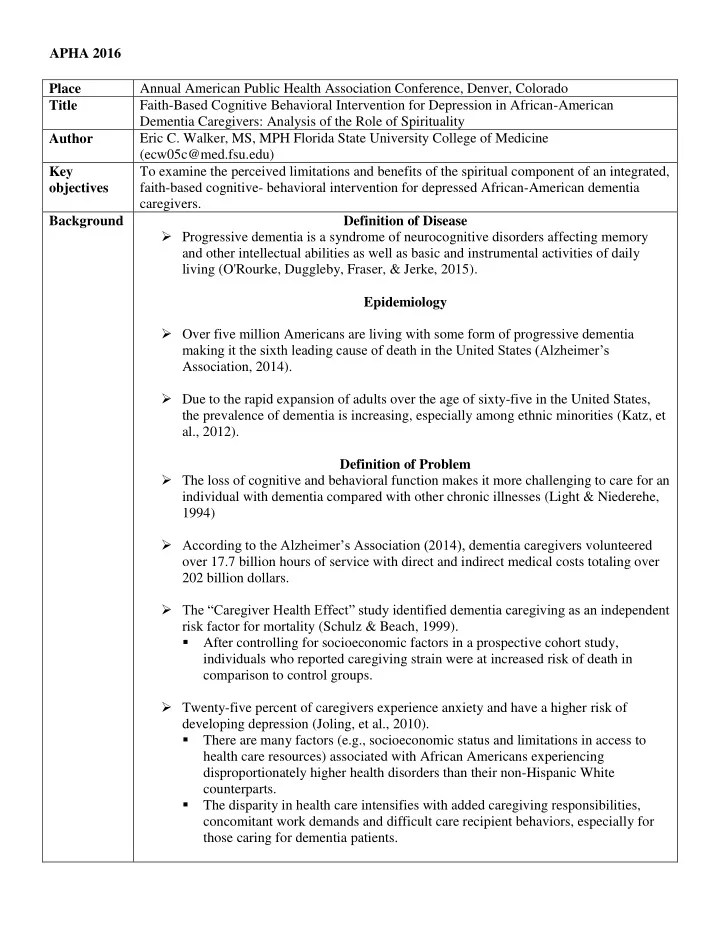

APHA 2016 Place Annual American Public Health Association Conference, Denver, Colorado Faith-Based Cognitive Behavioral Intervention for Depression in African-American Title Dementia Caregivers: Analysis of the Role of Spirituality Eric C. Walker, MS, MPH Florida State University College of Medicine Author (ecw05c@med.fsu.edu) Key To examine the perceived limitations and benefits of the spiritual component of an integrated, faith-based cognitive- behavioral intervention for depressed African-American dementia objectives caregivers. Background Definition of Disease Progressive dementia is a syndrome of neurocognitive disorders affecting memory and other intellectual abilities as well as basic and instrumental activities of daily living (O'Rourke, Duggleby, Fraser, & Jerke, 2015). Epidemiology Over five million Americans are living with some form of progressive dementia making it the sixth leading cause of death in the United States (Alzheimer’s Association, 2014). Due to the rapid expansion of adults over the age of sixty-five in the United States, the prevalence of dementia is increasing, especially among ethnic minorities (Katz, et al., 2012). Definition of Problem The loss of cognitive and behavioral function makes it more challenging to care for an individual with dementia compared with other chronic illnesses (Light & Niederehe, 1994) According to the Alzheimer’s Association (2014), dementia caregivers volunteered over 17.7 billion hours of service with direct and indirect medical costs totaling over 202 billion dollars. The “Caregiver Health Effect” study identified dementia caregiving as an independent risk factor for mortality (Schulz & Beach, 1999). After controlling for socioeconomic factors in a prospective cohort study, individuals who reported caregiving strain were at increased risk of death in comparison to control groups. Twenty-five percent of caregivers experience anxiety and have a higher risk of developing depression (Joling, et al., 2010). There are many factors (e.g., socioeconomic status and limitations in access to health care resources) associated with African Americans experiencing disproportionately higher health disorders than their non-Hispanic White counterparts. The disparity in health care intensifies with added caregiving responsibilities, concomitant work demands and difficult care recipient behaviors, especially for those caring for dementia patients.
African Americans with depression are 33% - 50% more likely to go untreated (Simpson, Krishnan, & Ruiz, 2007). Medical mistrust, lack of access, and stigma are all factors that contribute to the mental health disparities African Americans face. The “Black Church” continues to play an important role in helping to meet the mental health needs of its community. According to the National Comorbidity Survey, individuals were most comfortable seeking mental health care from religious leaders (23.5%) rather than psychiatrists (16.7%) (Wang, Berglund, & Kessler, 2003). Therefore, religious leaders are often regarded as gatekeepers to mental health care in the African American community. However, many of these leaders lack the sufficient training to manage psychological disorders such as depression (Williams, Gorman, & Hankerson, 2014). Cognitive-behavioral interventions have been shown to mitigate the effects of depression in individuals caring for family members with dementia (Schulz, et al., 2003). Cognitive-behavioral interventions enhance positive coping strategies and decrease depressive symptoms. However, availability, accessibility, sociocultural, and economical barriers have diminished its uptake by rural-residing and minority populations (Glueckauf, et al., 2009). Although depression-reduction interventions (e.g., cognitive-behavioral therapy) have been effective in improving emotional and physical health, ethnic minorities have had limited access to these interventions due to transportation and financial barriers (Glueckauf, et al., 2012). Methods Research Design This pilot study was an open-ended clinical trial Participants were administered a spiritually-modified, twelve-week telephone-based cognitive-behavioral intervention, which consisted of both group and individuals sessions. Faith-based, cognitive-behavioral intervention sessions provided the caregivers knowledge about dementia, caregiving skills-building exercises, and emotional support. Data Analytic Strategy Qualitative data from the individual semi-structured interviews were collected and analyzed using the grounded theory method. Transcripts of digital recordings of each interview was analyzed for the major themes described by caregivers and their facilitators. Recurring ideas across transcripts were identified and grouped into themes. Themes were further analyzed and categorized through concept mapping.
Inclusion Criteria Caregivers (1) are a family member or significant other of an adult (>59 years) with progressive dementia (2) spend at least 6 hours per week in providing direct care to the care recipient (3) score >9 on the Patient Health Questionnaire-9 (depression module) (4) are 18 years of age or older. Facilitators (1) bachelor’s degree, (2) at least two years of pastoral care experience in providing support to adults with health problems, and (3) positive recommendations from health ministry supervisors and pastors. Semi-Structured Interview Questions Caregiver Perception of the Spiritual Aspects of the Sessions 1. Were spiritually-related activities or discussion included in the last session? 2. How did you feel about engaging in those spiritual activities with your group? 3. How has the spiritual component of the session influenced your daily caregiving activities? Facilitator's Perceptions of the Spiritual Aspects of the Sessions 1. Did you include spiritually-related activities in the last session? 2. Would you like to have more, less, or different spiritual activities included in the sessions? 3. Have you encountered any difficulties in incorporating spiritual activities into the sessions? Results Descriptive Statistics Participants Twelve African-American caregivers, nine women and 3 men, were participants in the ACTS 2 pilot study. The mean age, years of education and months of dementia caregiving are 54.50 (SD = 11.87), 15.30 (SD = 2.10), and 34.25 ( SD = 35.64), respectively . Four African-American faith community workers, three women and one man, served as lay pastoral care facilitators. The mean age, years of education and years of lay pastoral care service are 59.75 (SD = 8.88), 16.25 (SD = 1.71), and 16.50 ( SD = 11.70), respectively .
Key Findings Positive perception of the spiritual component expressed from the participants. Positive perception remained constant across participants despite variation in implementation Caregivers felt that the spiritual component had a positive impact on their physical, mental, and spiritual health The extent of the impact varied across the caregiver population. No negative perceptions expressed directly about the spiritual component of the program. However, there was some initial concern on how it would be implemented. Percieved Benefits Perceived Limitations
Recommend
More recommend